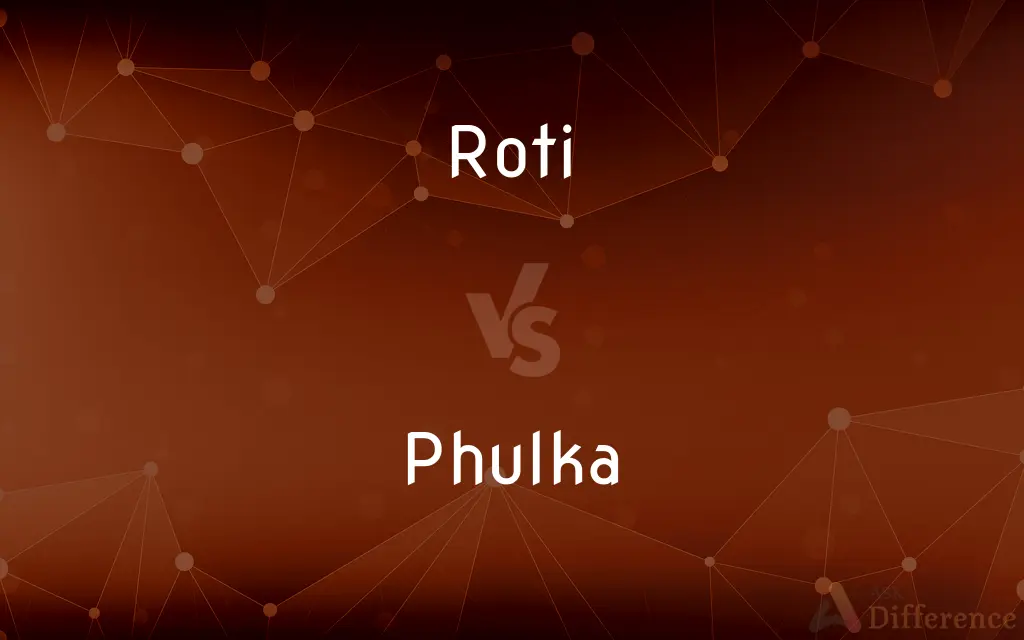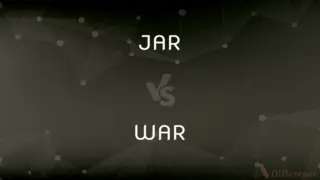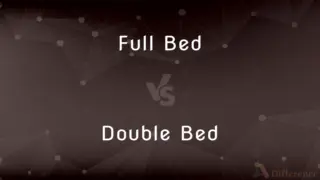Roti vs. Phulka — What's the Difference?
By Tayyaba Rehman — Published on December 24, 2023

Difference Between Roti and Phulka
Table of Contents
ADVERTISEMENT
Key Differences
In the vast and diverse culinary landscape of India, breads are an essential component. Two of the most popular breads are Roti and Phulka. Roti is a generic term used across India referring to bread. It's often made from whole wheat flour and cooked on a tava or griddle. On the other hand, Phulka, while similar in preparation to a roti, is distinct because of its cooking process.
Roti and Phulka are both unleavened breads, which means they don't use any fermenting agents like yeast or baking powder. Roti, being a broad term, can encapsulate many types of Indian breads including those that are thicker or have added ingredients. Phulka is usually simpler, being made from just whole wheat flour, water, and a pinch of salt.
While Roti can be cooked on various surfaces like a griddle or even directly on flame depending on personal preference, Phulka has a specific cooking method. After being partially cooked on a tava, a Phulka is placed directly on a flame which causes it to puff up, giving it its characteristic appearance.
In terms of consumption, both Roti and Phulka serve as a staple food in many Indian households. They are often paired with a variety of dishes, from curries to dry vegetables. While Roti can be a generic accompaniment to any meal, Phulka, with its light and airy texture, often complements lighter meals.
Comparison Chart
Definition
A general term for Indian bread.
A puffed version of roti.
ADVERTISEMENT
Ingredients
Can vary, but usually whole wheat flour.
Primarily whole wheat flour, water, and a pinch of salt.
Cooking Surface
Can be tava/griddle or direct flame.
Partially on tava, then directly on flame.
Texture
Can vary from soft to slightly thicker.
Light and puffy.
Varieties
Encompasses a range of Indian breads.
Specific type of roti with a distinct cooking method.
Compare with Definitions
Roti
An Indian unleavened bread made primarily from whole wheat flour.
She served the curry with freshly made roti.
Phulka
A type of Indian roti that puffs up when cooked directly on flame.
The phulka inflated like a balloon when she put it over the flame.
Roti
A flat, round bread popular in many South Asian countries.
Roti is a staple in most Indian meals.
Phulka
An unleavened bread, lighter and airier than the usual roti.
For a lighter meal, she preferred phulka over other breads.
Roti
A broad term that encompasses various types of Indian breads.
From plain roti to stuffed variants, there's a lot to explore.
Phulka
A popular North Indian bread, known for its soft and fluffy texture.
The softness of the phulka made it melt in her mouth.
Roti
A traditional bread that's been part of Indian cuisine for centuries.
Making roti has been a cherished family tradition.
Phulka
A roti variant that's partially cooked on a tava and then on open flame.
Perfecting the phulka requires mastering the art of tava and flame cooking.
Roti
A versatile bread that can be paired with a variety of dishes.
Whether it's chicken curry or lentils, roti is the perfect accompaniment.
Phulka
A staple bread often eaten with vegetables and light curries.
She served the spinach curry with freshly made phulka.
Roti
See chapati.
Roti
A kind of unleavened flatbread commonly consumed in South Asia and the Caribbean.
Nepalis eat sweet fried rice-flour doughnuts called sel roti.
Common Curiosities
Can Roti be made from flours other than wheat?
Yes, roti can be made from various flours, but whole wheat is the most common.
Are Roti and Phulka the same?
While both are Indian breads, Phulka is a specific type of roti with a distinct cooking method.
Why does Phulka puff up?
Phulka puffs up due to the moisture in the dough turning into steam when exposed to direct flame.
Why is Phulka sometimes called a "puffed roti"?
Phulka is referred to as "puffed" due to its characteristic inflation when cooked on flame.
Can Roti be stored for later use?
Yes, roti can be stored, but it's best consumed fresh for optimal taste.
What is Roti?
Roti is a general term for unleavened Indian bread made primarily from whole wheat flour.
How is Roti usually served?
Roti is often served with curries, lentils, and various vegetable dishes.
Is Phulka healthier than other types of Roti?
Phulka is lighter and often considered healthier due to its simple ingredients and cooking method.
How does Phulka differ from Roti?
Phulka is a puffed version of roti, cooked partially on a tava and then directly on flame.
What's the origin of the word Roti?
The word "roti" is derived from the Sanskrit word "roṭikā", meaning "bread".
Can Roti be flavored or stuffed?
Yes, there are many variants of roti with added flavors, spices, or stuffings.
Is Roti gluten-free?
Traditional roti made from whole wheat flour contains gluten. However, gluten-free variants can be made using other flours.
How is Phulka different from chapati?
Chapati is similar to phulka, but the terms are often used interchangeably in some regions. Both are types of roti.
Is Phulka consumed daily in Indian households?
Many North Indian households consume phulka regularly as part of their staple diet.
Do you need special equipment to make Phulka?
A tava (or griddle) and a gas flame are typically used, but no special equipment is needed.
Share Your Discovery

Previous Comparison
JAR vs. WAR
Next Comparison
Full Bed vs. Double BedAuthor Spotlight
Written by
Tayyaba RehmanTayyaba Rehman is a distinguished writer, currently serving as a primary contributor to askdifference.com. As a researcher in semantics and etymology, Tayyaba's passion for the complexity of languages and their distinctions has found a perfect home on the platform. Tayyaba delves into the intricacies of language, distinguishing between commonly confused words and phrases, thereby providing clarity for readers worldwide.













































